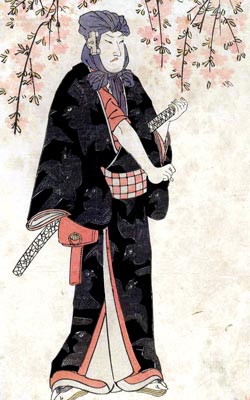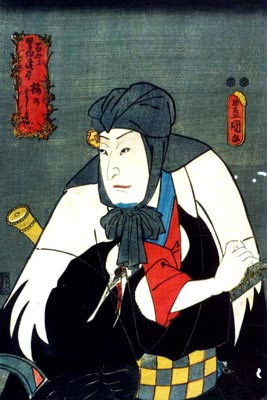| UME NO YOSHIB╩ |
| Play title | Suda no Haru Geisha Katagi |
| Author | Namiki Gohei I |
| History |
The drama "Suda no Haru Geisha Katagi" was premiered in the 1st lunar month of 1796 at the Kiriza [casting]. The hero of this drama, the otokodate Yoshibŕ, was based on a real person of the Genroku era, Umeshibu Kichibŕ, who murdered in 1689 in ďsaka a decchi named Ch˘kichi to steal his money. The star Sawamura S˘jűr˘ I was the first actor to portray Yoshibŕ on stage. The role was brought to Edo from ďsaka by the Kamigata playwright Namiki Gohei I, who turned it into an Edo otokodate and wrote "Suda no Haru Geisha Katagi" for Sawamura S˘jűr˘ III. |
| Structure |
The lastest revival at the National Theatre was made up of 3 acts and 8 scenes [more details]. |
| Key words |
Decchi Kosan-kingor˘mono Mimeguri Jinja Mugen no Kane Muk˘jima ďkawa ďkawabata Otokodate Sewamono Sumidagawa Umebori Yoshibŕ Ume-no-yoshibŕmono Umeshibu Kichibŕ |
| Summary |
Act I, Scene 1: The Mimeguri River Bank at Muk˘jima Kanaya Kingor˘, a retainer of the Chiba clan in Shim˘sa Province, has eloped with Kosan, the daughter of Mishima Hayato of the same clan because their love affair has met with disapproval. Just at this time, a precious treasure of the Chiba clan, a poetry card, is found missing. Kingor˘, knowing that he is suspected as the culprit, searches for the poetry card together with Kosan who by this time has demeaned herself to becoming a courtesan. Ume no Yoshibŕ is obliged to Hayato for past favors and because of this and also because of his inborn spirit of chivalry, he lends his assistance to Kingor˘. Yoshibŕ is a popular otokodate known by his purple head-cloth bearing a "poem of endurance", a gift from his former master, Hayato, intended to remind him of the errors of his youth. His assistance encourages Kingor˘ and Kosan. In fact, the poetry card has been stolen by Sone Bangor˘, an evil warrior of the Chiba clan, in retaliation for Kosan's refusal to accept his love. Shigaraki Kanjűr˘ of the same clan is sympathetic with Kingor˘ and is also moved by Yoshibŕ's devotion. He offers Yoshibŕ 100 ry˘ to be used as a part of the money needed to free Kosan from her indenture. In the Edo period, 100 ry˘ was an enormous amount of money. Act I, Scene 2: The Daikokuya Tea House in Muk˘jima His desire for Kosan still burning even now that she has become a courtesan, Bangor˘ asks Genbŕbori no Genbŕ, a chivalrous commoner (otokodate), for his collaboration. Genbŕ and Ume no Yoshibŕ have long been at odds and, what is more, Genbŕ is in love with Yoshibŕ's wife Koume. Genbŕ thus complies with Bangor˘'s request. Plotting with his follower Jippeiji, Genbŕ loans counterfeit money to Kingor˘ who he knows to be badly in need of money for Kosan's ransom. At the very moment Kingor˘ is about to use the money, Bangor˘ discloses it to be bogus. Fortunately Yoshibŕ appears on the scene. He settles the matter by handing over the 100 ry˘ received from Kanjűr˘ as a part of the ransom. At this juncture, a certificate stating that Bangor˘ has received the poetry card from Genbŕ is exposed by mistake. Yoshibŕ thus realizes the nature of the evil plan and, firmly determined, he takes off his purple cap of "endurance", a thing he has sworn never to do on any occasion. However, Genbŕ burns up the certificate using a magnifying glass. Act II, Scene 1: A Rice Shop in Kuramae Ume no Yoshibŕ's wife, Koume, has a younger brother called Asajir˘. He works under the name Ch˘kichi as an apprentice (decchi) under Sajibei, Ito's Kanjűr˘ uncle, who owns a rice shop at Kuramae. Ch˘kichi is entreated by his sister and brother-in-law to raise the balance required to free Kosan. He asks his lover Okimi, his master's daughter, to assist in raising the money. A love letter written by Okimi and addressed simply to "Ch˘" as a short form of "Ch˘kichi" is misdelivered to another apprentice named Ch˘gor˘ who is also in love with Okimi. Jealous of Ch˘kichi, Ch˘gor˘ steals 100 ry˘ from the shop and puts the blame on Ch˘kichi and Okimi. Kanjűr˘, who enters the scene at this point, sees through the intrigue. Ch˘kichi is held guiltless but, his love affair with his master's daughter having come to light; he is locked up in an upstairs room. Act II, Scene 2: outside the Rice Shop at Kuramae In the evening, Ch˘kichi's sister, Koume, calls to him from outside the wall of the rice shop where Ch˘kichi is imprisoned upstairs. Ch˘kichi assures her that he will not fail to deliver the money within this very night. Feeling relieved, Koume makes her exit. Act II, Scene 3: an Inner Room of the Rice Shop Unable to resist his dear sister's supplication, Ch˘kichi promised her that he would be ready with the money by eight o'clock, but he is in fact at a total loss as to where to get the money. 100 ry˘ is not a sum then an apprentice has easy access to. Suddenly he hears the song "Umegae", a j˘jűri, being sung by the neighbor next door. The song tells the story of Umegae, a courtesan desperate for money. In the song, Umegae beats a wash basin to make it sound like a bell (mugen no kane) and while doing so intently prays for money which she wants immediately even if obtaining the money now means that she must go to hell after death. At this moment, a shower of gold coins falls from the heaven. Ch˘kichi decides to try this method. Then, Okimi comes upstairs and while wrangling with Ch˘gor˘ about the money, throws down 100 ry˘. Ch˘kichi picks it up and runs out. Act II, Scene 4: at the Side of the ď River Ch˘kichi is assailed by a burglar at the side of ď River. Ume no Yoshibŕ rescues him, and appeals to him for the loan of the money. Ch˘kichi does not know his brother-in-law's face. Not realizing him to be his own brother-in-law, he refuses the request and insists that the money is for his brother-in-law and cannot be lent out. Yoshibŕ, who does not realise that Ch˘kichi is the younger brother of his wife Koume, murders the young decchi. In the process Yoshibŕ's little finger was bitten off. The killer flees but he carelessly drops his wallet. When Koume sees the missing finger in the corpse's mouth, she realises her husband is responsible. To bear the guilt herself she cuts off her own finger and kills herself. Moreover, Yoshibŕ's wallet is picked up by Genbŕ. Act III, Scene 1: Yoshibŕ's House Genbŕ appears with the wallet to levy blackmail on Ume no Yoshibŕ. He proposes to exchange the poetry card for Yoshibŕ's wife Koume. Helplessly Yoshibŕ gives in. However, the poetry card is found to be a fake. Act III, Scene 2: The Bank of the River Chasing after Genbŕ, Ume no Yoshibŕ slays Bangor˘ and Jippeiji at the bank of the Sumida River, and recovers the poetry card. With the poetry card in hand, Kingor˘ and Kosan happily return to the Chiba family. |
| Comments |
The role of Yoshibŕ is closely associated to the Sawamura S˘jűr˘ line of actors. |
| Trivia |
The white herons and black crows on the kimono of Yoshibŕ symbolize innocence and bad luck respectively. This pattern immediately identifies the character of Yoshibŕ. |
 |
 |
|
The actor Sawamura Gennosuke I playing the role of Yoshibŕ in the drama "Suda no Haru Geisha Katagi", which was staged in the 3rd lunar month of 1810 at the Nakamuraza (print made by Utagawa Toyokuni I) |
The actor Sawamura Ch˘jűr˘ V portraying Yoshibŕ in a print made by Utagawa Toyokuni III |
|
|
| Contact | Main | Top | Updates | Actors | Plays | Playwrights | Programs | Links | FAQ | Glossary | Chronology | Illustrations | Prints | Characters | Derivatives | Theaters | Coming soon | News |